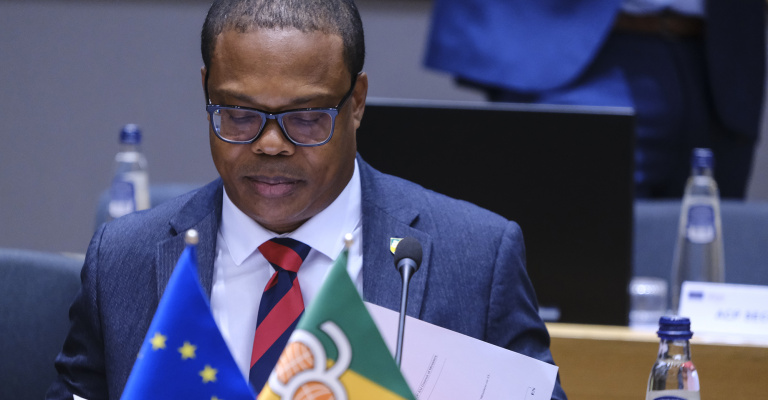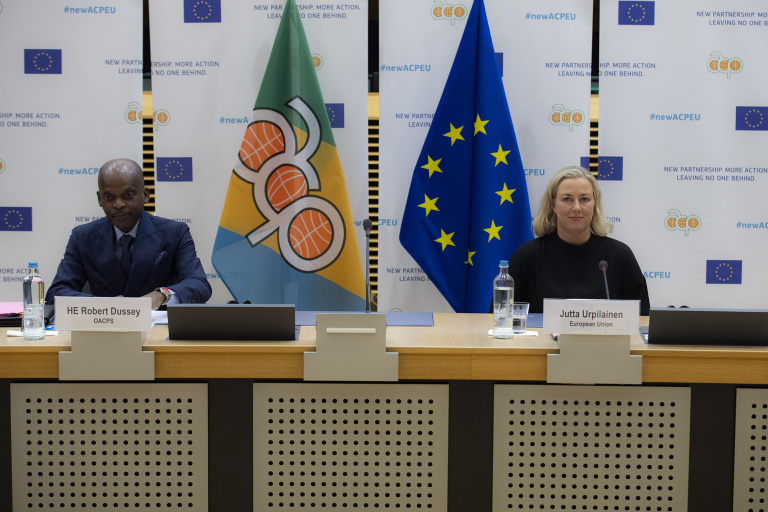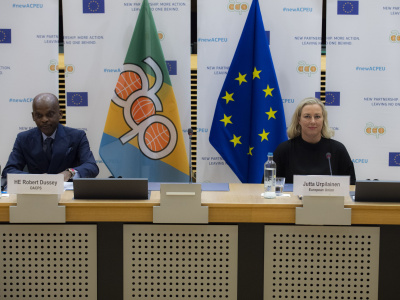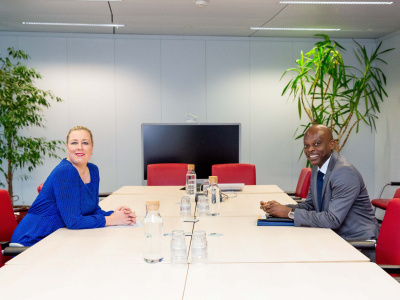
The OACPS-EU partnership: Damage control or saving the last pieces?
With South Africa leaving the Organisation of African, Caribbean, Pacific States (OACPS) and Hungary blocking the new partnership agreement between the EU and the OACPS – one year and a half after negotiators finalised the draft agreement – the momentum of a new partnership seems to have vanished.
The relationship between the EU and the (formerly named) African, Caribbean and Pacific (ACP) Group of States goes all the way back to 1975. It has been governed through a series of partnership agreements, the most recent of which – the Cotonou agreement – was supposed to end in 2020 but has been extended multiple times.
The successor agreement – the so-called post-Cotonou agreement – was agreed by EU and ACP negotiators in April 2021, but hasn’t been formally signed yet. It is supposed to serve as the new legal framework and guide political and economic relations between EU and ACP countries for the next twenty years. While the raison d’etre of maintaining such an agreement between the EU and the ACP has been debated, the political traction that guided the negotiations seems to be waning on both sides due to delays and uncertainties.
The Luanda summit
The tenth OACPS summit of heads of state took place from 6 to 10 December in Luanda under Angola’s chairmanship, with the aim of building a “resilient and sustainable OACPS” and positioning it as a strong global player. Taking place three years after the last one, this tenth summit was the opportunity to discuss global challenges of importance to the OACPS and cooperation with the EU and other international partners.
But behind the scenes, the main question was whether – and when – the new partnership agreement between the EU and the OACPS will finally enter into force. In the final declaration, members of the organisation urged the EU to solve internal blockages and proceed with the signature of the new agreement by the end of June 2023, as planned.
Few heads of state or government showed up during the summit in Luanda. Some claimed that the international agenda – with COP15 taking place simultaneously and the US-Africa leaders summit happening a few days later – was not optimal to ensure high-level participation.
EU international partnerships commissioner Jutta Urpilainen chose to attend COP15 instead of the OACPS summit, and European Council president Charles Michel and UN secretary general António Guterres made their opening statements virtually. Invited for the first time, the co-chair of the ACP-EU Joint Parliamentary Assembly, member of the European Parliament Carlos Zorrinho, attended the summit. Members of the assembly have fought to maintain a key role in the partnership and are among those pushing for the rapid signature of the agreement.
Brussels Council of ministers
At a joint meeting between OACPS and EU ministers in Brussels the week before, attendance was high, but this was also due to the fact that the AU-EU college-to-college meeting was taking place in Brussels around the same time. At the request of ACP countries, a discussion took place on the conclusion of the EU-OACPS agreement. According to some participants, debates were honest and frank, including on the main reasons for the delay of the signature on the EU’s side.
Ministers also discussed EU-OACPS cooperation in international fora, and notably in view of COP15, where both sides called for an ambitious global agreement and announced that they would co-host a high-level event on biodiversity action for and by the Global South.
One step forward and two steps back
On 15 April 2021, chief negotiators Jutta Urpilainen and Robert Dussey initialled the final draft of the new agreement. But a lack of unanimity on the EU’s side is preventing the formal signature of the agreement by the EU and has caused repeated delays. To speed up the process, the European Commission proposed to make it an EU-only agreement (as opposed to a mixed agreement, which is binding for EU member states too), but member states didn’t agree to this and are therefore required to sign up to it. Once the agreement is signed by the EU, ratification at the country level in the EU and ACP member states will certainly add more delays on both sides.
A lack of unanimity on the EU’s side is preventing the formal signature of the agreement by the EU and has caused repeated delays.
Blockage on the EU side is caused by Hungary’s refusal to sign the text because of its references to “legalisation of migration pathways” and disagreement on the implementation of the return and readmission principle. Ahead of the Council of ministers and the summit, Jutta Urpilainen met with Hungarian foreign affairs minister Péter Szijjártó, who agreed to “close cooperation with countries outside Europe”, but excluding the topic of migration. This blockage should also be seen in the broader context of the political and financial battle between the EU and Hungary on democratic values and rule of law, and the repeated vetoes that Hungary is using to block joint statements and decisions, especially in the area of EU foreign policy.
On the ACP side, there is growing disagreement from certain African countries on sensitive topics, such as gender equality, sexual rights and LGBTI issues. Furthermore, the cohesion within the OACPS is showing signs of fragility. South Africa has recently announced its decision to leave the organisation, effective from September 2022, because of shifting priorities and its desire to focus on other regional organisations, such as the South African Development Community (SADC) and the AU.
South Africa’s decision left many OACPS members surprised. Some fear a domino effect and worry other African countries will follow.
South Africa’s decision left many OACPS members surprised. Some fear a domino effect and worry other African countries will follow, which risks further jeopardising the rapid signature and overall political relevance of the agreement. Some also hope that the incoming presidency of the OACPS, Mozambique, will deploy particular efforts to convince its neighbour to reconsider its decision and rejoin the organisation.
Yet, while the relevance of the OACPS might be questioned on the African side, a number of other countries are showing interest in the OACPS: the Maldives have just become a new member while Sri Lanka is in talks to join the organisation. Some ACP countries, especially in the Caribbean and Pacific region, seem to still be eager to take part in the agreement and strengthen their partnership with the EU.
Signature delayed: countries annoyed and lost momentum
Nevertheless, the signature’s delay and South Africa’s decision to leave are negatively affecting the momentum and political interest for the agreement, with the risk of reopening debates that had been solved during the negotiations. For instance, is it worth maintaining the ACP-EU framework when other regional agreements are potentially more relevant, particularly in Africa?
A number of EU and ACP member states, as well as observers and analysts, including at ECDPM, have debated and questioned the political relevance and added value of a new agreement. At the end of the day, the new agreement is the result of a pragmatic choice to set a framework for bilateral regional relations between the EU and a large group of states.
Both ACP countries and the EU insist on the importance of the special, long-term relationship and the political partnership that have been built over the years. If the structure of the new agreement built on a common umbrella and regional protocols make sense on paper, the articulation and consistency with other regional initiatives and bodies, notably in Africa, is not so obvious and there is a real risk of duplication with the AU and the multitude of overlapping regional organisations in Africa.
Last but not least, the new agreement no longer has a financial string attached to it as the EU’s financial support is now channelled through the Neighbourhood, Development and International Cooperation Instrument (NDICI – Global Europe), which provides a general framework for the EU’s financial assistance globally. Unlike the previous situation under the European Development Fund, agreement between the EU and the 78 ACP countries is no longer needed to continue to financially support partner countries from Africa, the Caribbean and the Pacific.
Signing the agreement and keeping it alive
Four years after the start of negotiations on the post-Cotonou agreement in October 2018, and 18 months after the new agreement was initialled by the EU and ACP negotiators in April 2021, the situation is still lingering. There are increasing uncertainties about whether or not – and if so, when – the new agreement framing the relations between the EU and ACP countries will finally be in place.
These delays have undoubtedly affected the political traction on both sides, while the urgency to maintain the cohesion and added value of the partnership seems even more pressing in the current geopolitical context where alliances are essential. The challenge however is to find a way through the very opposed dynamics currently at play regarding the relevance and impact of this partnership agreement. To make it happen, some might want to contain the impact of the storm induced by South Africa leaving, while others might try to save the last pieces of the partnership.
In any case, there is growing impatience on the EU side to solve the problem and find a way to overcome internal blockages – especially at the Council level. The pressure will be high on the incoming Swedish presidency, who will play a key role in this regard in 2023.
The views are those of the authors and not necessarily those of ECDPM.






